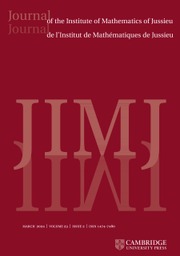Crossref Citations
This article has been cited by the following publications. This list is generated based on data provided by Crossref.
Macintyre, Angus
2016.
Turing meets Schanuel.
Annals of Pure and Applied Logic,
Vol. 167,
Issue. 10,
p.
901.
D’Aquino, Paola
Fornasiero, Antongiulio
and
Terzo, G.
2021.
A weak version of the strong exponential closure.
Israel Journal of Mathematics,
Vol. 242,
Issue. 2,
p.
697.




